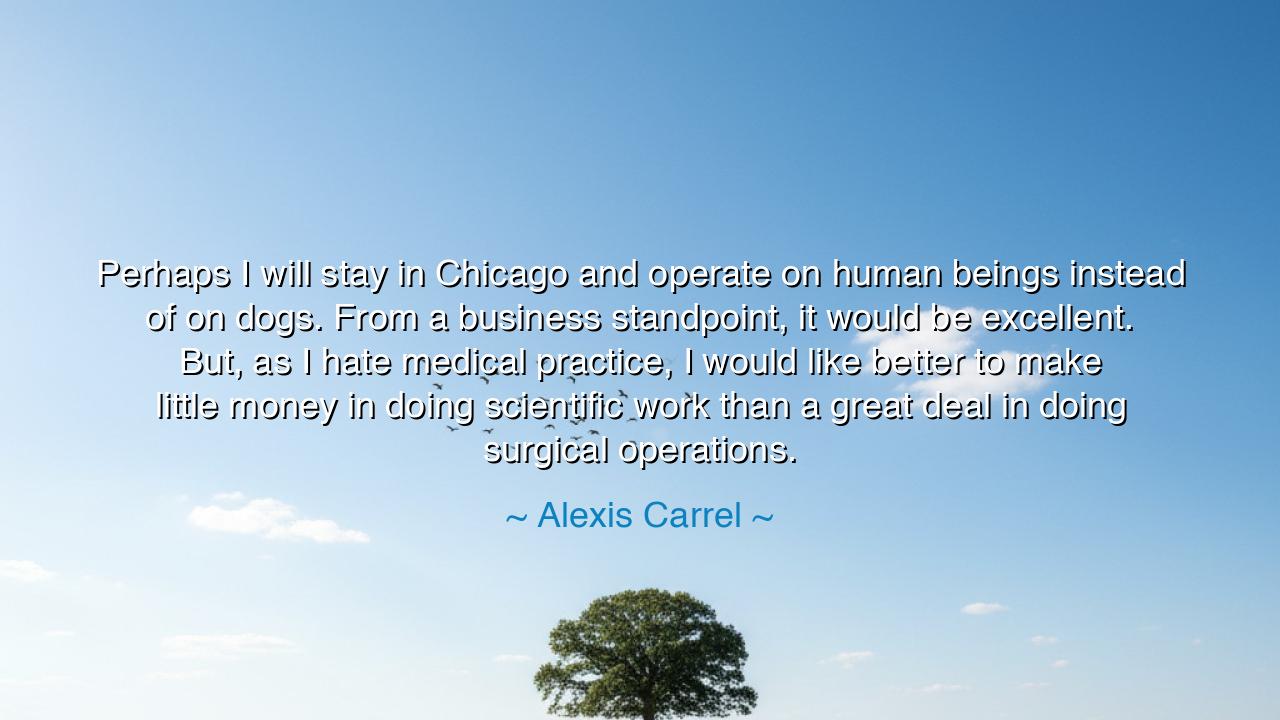
Perhaps I will stay in Chicago and operate on human beings
Perhaps I will stay in Chicago and operate on human beings instead of on dogs. From a business standpoint, it would be excellent. But, as I hate medical practice, I would like better to make little money in doing scientific work than a great deal in doing surgical operations.






Hear the words of Alexis Carrel, surgeon and scientist, who once stood at the crossroads of wealth and wisdom: “Perhaps I will stay in Chicago and operate on human beings instead of on dogs. From a business standpoint, it would be excellent. But, as I hate medical practice, I would like better to make little money in doing scientific work than a great deal in doing surgical operations.” In these words we hear the eternal struggle of vocation versus profit, of truth-seeking versus comfort, of devotion to knowledge over the clamor of riches.
The origin of this quote rests in Carrel’s own life. A gifted surgeon, he developed groundbreaking techniques in vascular surgery and organ transplantation. In an age when many doctors pursued the prestige and wealth of medical practice, Carrel instead turned his heart toward scientific work, preferring the solitary discipline of research to the applause of the operating theater. His words reveal disdain for medicine when it becomes only a trade, only a business, divorced from the deeper calling of discovery. He chose poverty of gold but wealth of truth.
The ancients, too, revered such choices. Consider Socrates, who could have prospered as a sophist, selling clever words for coin. Instead, he chose the harder path of philosophy, questioning truth even unto death. Or think of Archimedes, who spurned power and riches to remain devoted to mathematics, declaring he would rather move the earth with a lever than sit at the tables of kings. Carrel joins this lineage: one who sacrificed wealth for the higher fire of knowledge, for the joy of unlocking the mysteries of life.
There is also within his words a warning: that medical practice, if loved only for its profit, can become empty. Surgery done without devotion to healing, without love for the craft, is but a trade of blood for gold. Carrel, knowing his own heart, chose not to deceive himself. Better, he said, to earn little doing what one loves, than to earn much in hatred. This truth, though simple, is heroic: for many men know it, but few have the courage to live it.
Consider the story of Gregor Mendel, the monk who tended his peas in quiet obscurity. He had no wealth, no title, no medical practice. Yet his devotion to scientific work gave birth to the laws of heredity, changing forever the study of life. Had he abandoned his calling for a more profitable path, the world might have waited centuries longer for such truth. So too Carrel reminds us: the world’s greatest treasures often come not from those who seek fortune, but from those who forsake it.
The meaning of Carrel’s words is both motivational and deeply human. He declares that one must know oneself. If your soul does not burn for a path, even if that path promises riches, it will weigh you down as chains. If, however, your heart finds joy in discovery, in creation, in truth—even if it brings only a modest living—then that is the path of freedom and peace. For the measure of a life is not the weight of coin, but the worth of what it leaves behind.
The lesson is clear: choose work not by the profit it brings, but by the passion it awakens. If your labor feels hateful, no wealth will sweeten it. If your labor is beloved, no poverty will embitter it. The noblest lives are not those spent in pursuit of gold, but those spent in pursuit of truth, beauty, and service. Carrel’s choice shows us that even in a world dazzled by money, one can walk the path of devotion and leave behind a legacy far greater than wealth.
Practical action follows from this wisdom. Examine your own work with honesty: do you love it, or do you endure it only for pay? If it brings no joy, seek ways to bend it toward what you love, or gather courage to change paths. Support those who dedicate themselves to research, teaching, and truth, even if they live humbly. And remember always that fortune is fleeting, but knowledge, service, and discovery endure beyond generations. Thus Carrel’s words become not only confession, but command: live for what you love, and the world will be richer for it.






AAdministratorAdministrator
Welcome, honored guests. Please leave a comment, we will respond soon